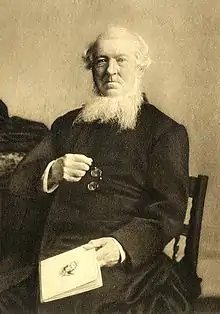George Rawlinson | |
|---|---|
 Rawlinson c. 1899 | |
| Camden Professor of Ancient History University of Oxford | |
| In office 1861–1889 | |
| Preceded by | Edward Cardwell |
| Succeeded by | Henry Francis Pelham |
George Rawlinson (23 November 1812 – 6 October 1902) was a British scholar, historian and Christian theologian.
Life
Rawlinson was born at Chadlington, Oxfordshire,[1] the son of Abram Tysack Rawlinson and the younger brother of the famous Assyriologist, Sir Henry Rawlinson. He was educated at Ealing School. Having taken a First in Literae Humaniores at the University of Oxford (from Trinity College) in 1838,[2] he was elected to a fellowship at Exeter College, in 1840, where he was a Fellow and tutor from 1842 to 1846. He was ordained in 1841, was curate at Merton, Oxfordshire, from 1846 to 1847, was Bampton Lecturer in 1859, and was Camden Professor of Ancient History from 1861 to 1889.[3]
In his early days at Oxford, Rawlinson played cricket for the University, appearing in five matches between 1836 and 1839 which have since been considered to have been first-class.[4]
He was elected as a member of the American Philosophical Society in 1869.[5]
In 1872 he was appointed canon of Canterbury, and after 1888 he was rector of the rich City of London benefice All Hallows, Lombard Street. In 1873, he was appointed proctor in Convocation for the Chapter of Canterbury.[3]
He married in 1846 Louisa Chermside, daughter of Sir Robert Alexander Chermside. They celebrated their golden wedding anniversary in 1896.
Canon Rawlinson died at his residence in Cathedral precincts, Canterbury, on 6 October 1902.[6]
Publications
His chief publications are his translation of the History of Herodotus (in collaboration with Sir Henry Rawlinson and Sir John Gardner Wilkinson), 1858–60; The Five Great Monarchies of the Ancient Eastern World, 1862–67; The Sixth Great Oriental Monarchy (Parthian), 1873; The Seventh Great Oriental Monarchy (Sassanian), 1875; Manual of Ancient History, 1869; Historical Illustrations of the Old Testament, 1871; The Origin of Nations, 1877; History of Ancient Egypt, 1881;[7] Egypt and Babylon, 1885; History of Phoenicia, 1889; Parthia, 1893; Memoir of Major-General Sir HC Rawlinson, 1898.[3]
His lectures to an audience at Oxford University on the topic of the accuracy of the Bible in 1859 were published in later years as the apologetic work The Historical Evidences of the Truth of the Scripture Records Stated Anew.
He was also a contributor to the Speaker's Commentary, the Pulpit Commentary, Smith's Dictionary of the Bible, and various similar publications. He was the author of the article "Herodotus" in the 9th edition of the Encyclopædia Britannica.[3]
References
- ↑ "RAWLINSON, Rev. Canon George". Who's Who. Vol. 53. 1901. p. 931.
- ↑ 'Oxford University Calendar 1895', Oxford: Clarendon Press, 1895. p.121.
- 1 2 3 4 Chisholm 1911.
- ↑ "George Rawlinson". www.cricketarchive.com. Retrieved 12 April 2013.
- ↑ "APS Member History". search.amphilsoc.org. Retrieved 26 April 2021.
- ↑ "Obituary - Canon Rawlinson". The Times. No. 36892. London. 7 October 1902. p. 4.
- ↑ Translated into Spanish by Spanish egyptologist Eduardo Toda y Güell in 1894.
Sources
- This article incorporates text from a publication now in the public domain: Chisholm, Hugh, ed. (1911). "Rawlinson, George". Encyclopædia Britannica. Vol. 22 (11th ed.). Cambridge University Press. p. 928.
External links
 Works by or about George Rawlinson at Wikisource
Works by or about George Rawlinson at Wikisource- Works by George Rawlinson at Project Gutenberg
- Works by or about George Rawlinson at Internet Archive
- The History of Herodotus, translated by George Rawlinson.
- Rawlinson, George. Historical Evidences of the Scripture Records Stated Anew: With Special Reference to the Doubts and Discoveries of Modern Times. New York: John B. Alden, 1885.